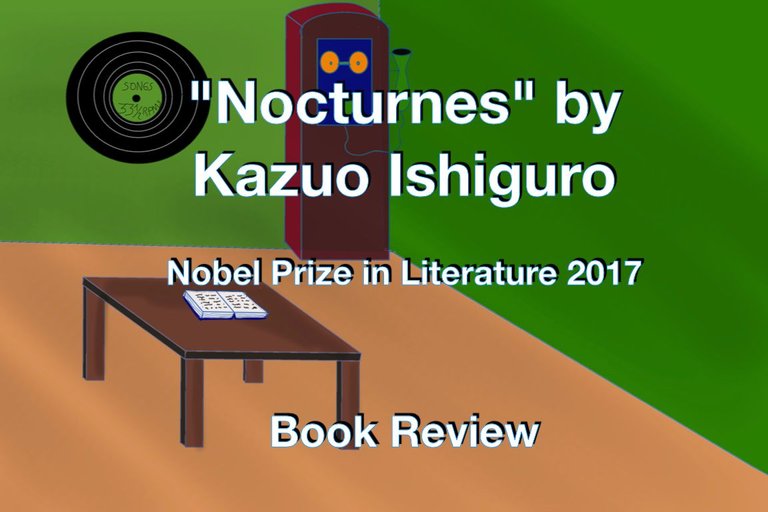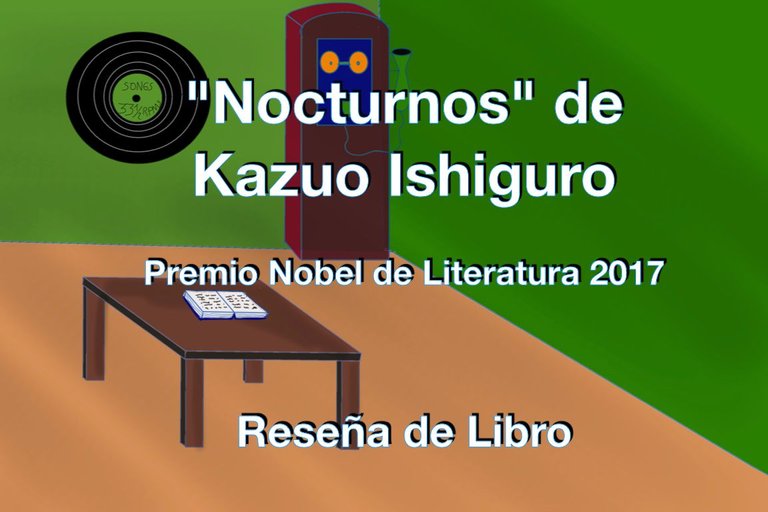“Nocturnes” by Kazuo Ishiguro | Book Review (ENG-SPA)


Five Stories of Music and Nightfall
You know, lately, I have experienced pleasant surprises in my journey through contemporary short fiction. And without a doubt, being outside of reading circles denies you the pleasure of knowing what writers have to say regardless of the genre they tackle. Regarding fiction, good fiction, I understand that it is a kind of modulation of reality. One that delves into the essence of being and its relationships with others, giving us more than just entertainment: an alternative world in which we live through the evocations that come through the imagination fueled by words and their meanings. In that sense, that was the feeling I experienced when reading Kazuo Ishiguro, an author of Japanese origin and British nationality, who was awarded the Nobel Prize in Literature in 2017.
“Nocturnes” is a collection of five stories that confronts the aspirations of youth and the reflection of maturity based on an evaluation of the protagonists' experiences that make you meditate on your own life. Published in 2009, its masterfully woven connecting element is music, and the backdrop is the hustle and bustle of the entertainment world in search of fame and fortune.
Written in the first person, “Nocturnes” takes you into the perspective of the musicians, be they singers, guitarists, saxophonists, and even cellists, to name those alluded to in the stories. Not forgetting those who, like parasites, benefit from being by their side for convenience, even those who simply cling to music to alleviate or exaggerate their ailments and frustrations. The narrator, while being the protagonist, is also a prism in the development of the dialogues, even becoming omniscient. Although I liked the use of Ellipsis, I must confess that it challenged my cultural background, despite the fact that it deals with common symbols of Western culture.
At first, because of the author's last name, I expected the stories to take place in the culture of the Far East, but on the contrary, I found myself immersed in Europe (London and Venice) and on the West Coast of the United States through the back and forth between the meccas of the music industry of our time.
The first story, “Crooner,” made me search the Web for three musical themes, which for me (being Latino) are little known, perhaps because they precede the crest of the fashion of my generation: “I Fall in Love Too Easily,” “By the Time I Get to Phoenix,” and “One for My Baby (And One More for the Road).” It is worth noting, to investigate the meaning behind the story. In that sense, as a bonus to what I read, I enjoyed them. They are songs where the lyrics are supported by exquisite musical arrangements, where the instrumentation, influenced by Jazz, with saxophone solos, and with soft piano and guitar arpeggios interspersed that fit with the beautiful voices that interpret them.
The other four stories: “Come Rain or Come Shine”, “Malvern Hills”, “Nocturne” and “Cellists”; explore themes that the writer rightly subsumes in the subtitle of the book: “Five Stories of Music and Nightfall”. In fact, in my opinion, the word Nightfall is an excellent metaphor that encompasses them from the perspective of someone who, in the antechamber of the evening of their life, evaluates, without escaping the unease of frustrations and their achievements. In addition, some of the situations that Ishiguro presents border on the absurd, in which we sometimes fall when we want to hide our flaws, indecisions, envy, and fears. Likewise, in the propensity to change in the face of criticism from others that makes us debate between pride and humility.
I believe it is a highly recommended book for lovers of literature and music that will take you on a journey that could resonate with you, even if you are not a musician or a writer. It is extensible to any profession or art. After all, we are all sensitive beings who walk the same paths sieved with particularities, with similar purposes.
If you have already read my comments on books, you will know that I like to investigate their translators. In that sense, the version of this splendid work was translated into Spanish by a singular Spanish writer, Antonio-Prometeo Moya, and who is said to be an enemy of awards and stardom (literary circus and mythomania). Perhaps that is why he does not have any awards to his name. Although, judging by this translation, he must be excellent in his narrative. So, browsing through his bibliography, I have already located one of his novels (Muerte de un Ciudadano por encima de toda sospecha) to get a closer look at his narrative style.
I hope you find my comments on this book of short stories, if I am not mistaken, unique in its narrative, by one of the most outstanding British writers of today, useful.
I wish you a happy reading. We will read each other soon.

Review originally written in Spanish by @janaveda, and translated into English with https://gemini.google.com/ (free version).
The thumbnail was created from my drawing made in Krita and edited with Keynote
Thanks for reading me. I hope this review is to your liking. I would very much like to read your comments in this regard to enrich myself with your criticism.
Tired...! Are you no longer satisfied with traditional social networks?
Then I invite you to get to know Hive by clicking here.
Join our global community, where uncensored freedom is our north.



“Nocturnos” de Kazuo Ishiguro | Reseña de libro
Cinco historias de música y crepúsculo
Saben, últimamente, he experimentado gratas sorpresas en mi periplo por la narrativa breve contemporánea. Y es que, sin duda, estar fuera de los círculos de lectura, te niega el placer de conocer lo que tienen que decir los escritores sin importar el género que aborden. En cuanto a la ficción, la buena ficción, entiendo que es una especie de modulado de la realidad. Una que profundiza en la esencia del ser y sus relaciones con los otros, dándonos más que diversión: un mundo alternativo en la cual vivimos a través de las evocaciones que devienen a través de la imaginación alimentada por las palabras y sus significados. En tal sentido, esa fue la sensación vivida al leer a Kazuo Ishiguro, un autor de origen japonés y nacionalizado británico, quien fue galardonado con el premio Nobel de Literatura en 2017.
“Nocturnos” es una colección de cinco relatos que confronta las aspiraciones de la juventud y la reflexión de la madurez con base en una evaluación de lo vivido por los protagonistas que te hacen meditar sobre tu propia vida. Publicado en el 2009, cuyo elemento de conexión, magistralmente hilvanado, es la música, y el telón de fondo, es el trajinar en el mundillo del espectáculo en búsqueda de fama y fortuna.
Escrito en primera persona, “Nocturnos”, te lleva a adentrarte en la perspectiva de los músicos, ya sean cantantes, guitarristas, saxofonistas, e incluso violonchelistas, por nombrar a los aludidos en los relatos, sin olvidar, a quienes como rémoras se benefician de estar a sus lados por conveniencia, incluso, a quienes simplemente asido a la música alivian o exageran sus dolencias y frustraciones. El narrador, al mismo tiempo que es protagonista, también es prisma en el desarrollo de los diálogos, llegando, incluso, a ser omnisciente. Aunque me gustó mucho el uso de las elipsis, debo confesar, que retó mi bagaje cultural, a pesar de manejarse con símbolos comunes de la cultura occidental.
En un principio, por el apellido del escritor, esperaba que las acciones se desarrollaran en la cultura del lejano oriente, pero al contrario, me vi inmerso en la Europa (Londres y Venecia) y en la costa oeste de los Estados Unidos por intermedio del vaivén entre las mecas de la industria musical de nuestro tiempo.
El primer relato, “El cantante melódico”, me hizo buscar en la Web, tres temas musicales, para mí (al ser latino) poco conocido, quizás porque preceden a la cresta de la moda de mi generación: “I fall in love too easily”, “By the time I get to Phoenix” y “One for my baby (And one more for the road)”. Cabe destacar, para indagar lo connotado detrás de la historia. En tal sentido, como un bono a lo leído, las disfruté. Son temas donde las letras están sustentadas por exquisitos arreglos musicales, donde la instrumentación, influido por el Jazz, con solos de saxofón, y con suaves arpegios de piano y guitarra intercalados que encajan con las bellas voces que las interpretan.
Los otros cuatro relatos: “Come Rain or Come Shine”, “Malvern Hills”, “Nocturno” y “Los violonchelistas”; explora temas que el escritor subsume con acierto en el subtítulo del libro: “Cinco historias de música y crepúsculo”. De hecho, a mi juicio, la palabra crepúsculo es una excelente metáfora que las engloba desde la perspectiva de alguien que, en la antesala del anochecer de su vida, evalúa, sin escapar del desasosiego de frustraciones y sus logros. Además, algunas de las situaciones que presenta Ishiguro, rayan en lo absurdo, en que a veces caemos las personas cuando se quiere ocultar las falencias, las indecisiones, las envidias y los miedos. Así mismo, en lo propenso al cambio ante la crítica de los demás que nos hace debatirnos entre la soberbia y la humildad.
Creo que es un libro muy recomendable para los amantes de la literatura y la música que te llevará por un camino que podría hacer eco en ti, a pesar de no ser músico o literato. Es extensible a cualquier quehacer: profesionista o artístico. Al fin de cuentas, somos todos seres sensibles que caminamos los mismos senderos tamizados de particularidades, con propósitos similares.
Si ya habéis leído mis comentarios sobre libros, ya sabréis que me gusta indagar en los traductores de los mismos. En tal sentido, la versión de esta espléndida obra, fue traducida al castellano por un singular escritor español, Antonio- Prometeo Moya, y de quien se reseña, es enemigo de los premios y del estrellato (circo literario y mitomanías). Quizás, sea por ello, que no tiene ningún premio en sus palmares. Aunque, al juzgar por esta traducción, debe ser excelente en su narrativa. Así que, husmeando entre su bibliografía, ya ubiqué una de sus novelas (Muerte de un ciudadano por encima de toda sospecha) para tener un acercamiento a su estilo narrativo.
Espero que encontréis útil mis comentarios sobre este libro de relatos, si no me equivoco, único en su narrativa, de uno de los escritores británicos más sobresaliente de la actualidad.
Os deseo una feliz lectura. Nos leemos pronto.

Reseña del libro por @janaveda
La miniatura se creó a partir de mi dibujo hecha en Krita y editada con Keynote
Gracias por leerme. Espero que esta reseña sea de su agrado. Me gustaría mucho leer sus comentarios al respecto para enriquecerme con sus críticas.
¡Cansado! ¿Ya no te satisfacen las redes sociales tradicionales?
Entonces, te invito a conocer Hive presionando aquí.
Únete a nuestra comunidad global, en donde la libertad sin censura en nuestro norte.

https://twitter.com/jnavedan/status/1759622871800742172
Esta publicación ha recibido el voto de Literatos, la comunidad de literatura en español en Hive y ha sido compartido en el blog de nuestra cuenta.
¿Quieres contribuir a engrandecer este proyecto? ¡Haz clic aquí y entérate cómo!
Muchas gracias por el soporte.